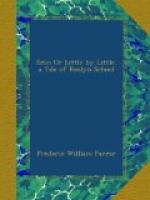CHAPTER X
THE LAST TEMPTATION
[Greek: ‘Ae
d’ Atae sthenazae te chai ’aztipos sunecha
pasas
Pollou ‘upechpzotheei,
phthaneei d’ de te pasan ep’ aiach
Blaptous’ anthxopous.]
Hom Il. ix. 505.
Time, the great good angel, Time, the merciful healer, assuaged the violence of Eric’s grief, which seemed likely to settle down into a sober sadness. At first his letters to his parents and to Fairholm were almost unintelligible in their fierce abandonment of sorrow; but they grew calmer in time,—and while none of his school-fellows ever ventured in his presence to allude to Vernon, because of the emotion which the slightest mention of him excited, yet he rarely wrote any letters to his relations in which he did not refer to his brother’s death, in language which grew at length both manly and resigned.
A month after, in the summer term, he was sitting alone in his study in the afternoon (for he could not summon up spirit enough to play regularly at cricket), writing a long letter to his aunt. He spoke freely and unreservedly of his past errors,—more freely than he had ever done before,—and expressed not only deep penitence, but even strong hatred of his previous unworthy courses. “I can hardly even yet realize,” he added, “that I am alone here, and that I am writing to my aunt Trevor about the death of my brother, my noble, only brother, Vernon. Oh how my whole soul yearns towards him. I must be a better boy, I will be better than I have been, in the hopes of meeting him again. Indeed, indeed, dear aunt, though I have been so guilty, I am laying aside, with all my might, idleness and all bad habits, and doing my very best to redeem the lost years. I do hope that the rest of my time at Roslyn will be more worthily spent than any of it has been as yet.”
He finished the sentence, and laid his pen down to think, gazing quietly on the blue hills and sunlit sea. A feeling of hope and repose stole over him;—when suddenly he saw at the door, which was ajar, the leering eyes and villainously cunning countenance of Billy.
“What do you want?” he said angrily, casting at the intruder a look of intense disgust.
“Beg pardon, sir,” said the man, pulling his hair. “Anything in my line, sir, to-day?”
“No!” answered Eric, rising up in a gust of indignation. “What business have you here? Get away instantly.”
“Not had much custom from you lately, sir,” said the man.
“What do you mean by having the insolence to begin talking to me? If you don’t make yourself scarce at once, I’ll—”
“O well,” said the man; “if it comes to that, I’ve business enough. Perhaps you’ll just pay me this debt,” he continued, changing his fawning manner into a bullying swagger. “I’ve waited long enough.”
Eric, greatly discomfited, took the dirty bit of paper. It purported to be a bill for various items of drink, all of which Eric knew to have been paid for, and among other things, a charge of L6 for the dinner at the “Jolly Herring.”




